Health examination
※ Fees are completely tax-excluded.
| New-hire health examination (health examination starting a new job), 8,300 yen (tax excl.) |
|
|---|---|
| Regular health examination: 4,300 yen |
|
Optional examinations
| Blood test: 3,000 yen |
|
|---|
Other optional examinations
| Gastrofiberscope examination (using a nasal tube camera) | 12,000 yen | |
|---|---|---|
| Colonoscopic examination | 20,000 yen | |
| Anesthesia during endoscopic examination (painless method) | 3,000 yen | |
| Helicobacter pylori examination (speedy) | 2,000 yen | |
| Urea breath test (UBT) | 5,300 yen | |
| Fecal occult blood test (2-day method) | 1,000 yen | |
| Abdominal ultrasonography | 5,000 yen | |
| Ultrasound echo of pharynx (thyroid gland, carotid artery) | 3,500 yen | |
| Tumor markers (stomach cancer, colon cancer, pancreatic cancer, liver cancer, lung cancer, prostate cancer, breast cancer, etc.) | From 2,000 yen | |
| Ultrasound echo of pharynx (thyroid gland, carotid artery) | Osteoporotic examination (bone marrow assay) | 1,000 yen |
| Osteoporotic examination (bone marrow assay) | 8,000 yen | |
| Hepatitis examination (type B, type C) | 3,000 yen | |
| HbA1c | 500 yen | |
| Lung function examination (lung age, etc.) | 3,300 yen | |
| ABC examination | 3,000 yen | |
| Electrocardiogram | 1,300 yen | |
About various of cancer examinations
Esophageal cancer examination
The endoscopic dyeing method does not overlook any lesions.
Smoking or drinking increase risk.
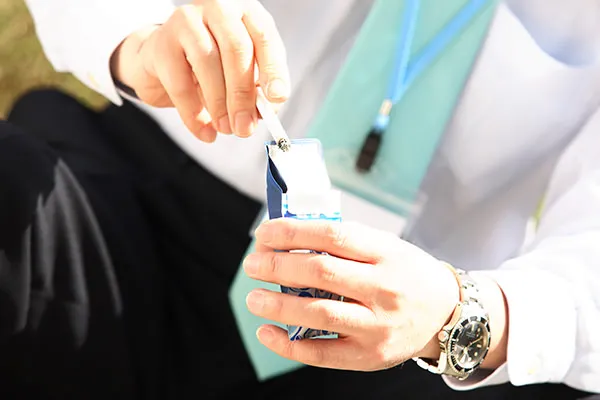
Esophageal cancer is increasing steadily, and it is said that in a few more years, 18,000 people will contract the disease annually.
The annual death rate rose to 10,000, and the prognosis for advanced cancer is still poor.
Did you know that people in high risk groups, which are those over 60, men, regular smokers or drinkers, people with symptoms of reflux esophagitis that are heartburn and belching, are likely to suffer from esophageal cancer?
Even missed by a barium X-ray
There are probably a lot of people who think that they had an abdominal examination that did not find any problem, so they are fine.
But it is not easy for a normal stomach cancer examination using barium to spot a slight change of the esophageal epithelium, which is an early indicator of esophageal cancer.
So our clinic has introduced the endoscopic dyeing method to perform detailed examinations for esophageal lesions which tend to be neglected by a stomach cancer examination.
This differs from normal endoscopy in that a coloring agent called Lugol’s solution is spread on the esophageal epithelium to diagnose lesions by spotting differences in its stainability.
Lugol changes to a brown color on normal esophageal epithelium, but the color does not change on abnormal epithelium, so it can be distinguished visually with ease.
Later we do a biopsy of the abnormal epithelium tissue and examine it closely with a microscope.
If esophageal cancer is discovered early, endoscopic esophageal mucosal resection surgery is minimally invasive and can be counted on to ensure a good recovery rate (100% survival for 5 years).
We urge everyone in high risk group to have this examination.
Stomach cancer and helicobacter pylori
Double check for presence of Helicobacter pylori: antibody examination and endoscopy.
Every year, 110,000 Japanese people contract stomach cancer, and about 50,000 of them die.
The death rate is tending to fall, but Japan’s stomach cancer occurrence rate remains the world’s highest.
Cancer prevention effects of eradicating Helicobacter pylori
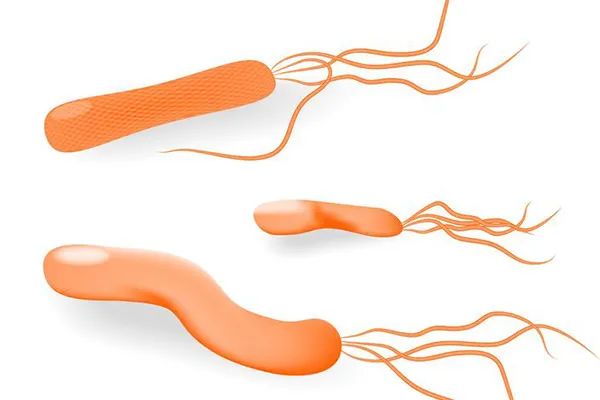
In recent years, Helicobacter pylori has been discovered in people’s stomachs, and it has been ascertained that it causes gastritis, gastric ulcers, and duodenal ulcers.
As a result of an epidemiological survey, in 1994, WHO (World Health Organization) designated Helicobacter pylori as a Group 1 carcinogen that causes stomach cancer.
Later, clinical research conducted in Japan showed that eradicating Helicobacter pylori prevents stomach cancer.
It is said that 60,000,000 Japanese people are infected with Helicobacter pylori.
Two percent of them, or about 1.04 million, suffer from gastric ulcers or duodenal ulcers, and 0.3%, or about 200,000 are struck by stomach cancer.
It is also reported that about 20,000 or about 10% of all stomach cancer patients are people with stomach cancer but without Helicobacter pylori.
Eradication cuts cancer cases by about 1/3
It has been reported that according to epidemiological research, people infected with Helicobacter pylori are 2.5 times as likely to contract stomach cancer than people without it.
It is said that between 60% and 70% of people over the age of 50 carry Helicobacter pylori, so it is probably correct to say that people over 50 who are infected with Helicobacter pylori are now in a group at high risk of stomach cancer.
This shows that the first step in avoiding stomach cancer is to learn if you are or are not a Helicobacter pylori carrier, and if you are, have it eradicated.
Recent research in Japan has shown that the stomach cancer occurrence rate among people who have had Helicobacter pylori eradicated is about 1/3 of those who have not had this done.
We believe that the younger a person is when it is eradicated, the greater its stomach cancer prevention effects.
There are various ways to diagnose people to find out whether or not they carry Helicobacter pylori, but our clinic uses two simple methods that reveal the result on-the-spot: a test to detect Helicobacter pylori in urine and the nasal tube gastrofiberscope examination.
We use both because only one examination could overlook a false negative (a negative result even though there are bacteria).
If the result of a urine test of a patient is positive, we investigate that patient for the presence of Helicobacter pylori by using an endoscope to detect and do a biopsy of lesions in the esophagus, stomach, and duodenum (sampling part of the gastric mucous membrane).
When we detect the presence of Helicobacter pylori, we start eradication therapy.
We decide to eradicate it by performing a urea breath test, so we do not do another endoscopic examination.
People with atrophy of the gastric mucous membrane or ulcers remain at risk of cancer, so we recommend that they regularly receive endoscopic examinations.
Generally, if a person is infected with Helicobacter pylori in childhood, without eradication therapy, the person remains infected.
It is thought that Helicobacter pylori does not infect adults, so there is no danger of reinfection after eradication.
A barium examination is highly likely to overlook a small lesion in the stomach, so it is correct to say that regardless of whether or not symptoms exist, it is important for people to aggressively arrange to receive Helicobacter pylori diagnosis and an endoscopic examination in order to protect themselves from stomach cancer.
The Minato shiba Clinic always performs examinations on every consultation day, so please do not hesitate to ask about it.
You have to make a reservation for an examination.
Diagnosis and eradication at the patient’s expense
And we diagnose Helicobacter pylori and perform eradication therapy at the patients’ expense.
If you do not wish an endoscopic examination, the diagnosis and therapy are both provided for a price of 20,000 yen (tax-excl.), so think about this approach.
For patients who find a barium examination of their stomach unbearable, the ABC blood test
Drinking barium to take a barium examination is distasteful, and patients are told that they must not burp during the examination. And if they do not take a purgative to remove the barium from their stomach, they will feel terrible, so we think that many people they will skip this exam if they can.
Some people have died following this examination.
But we can now ascertain whether or not a person has a diseased stomach by an ABC type blood test.
Some say that this method is an examination technique that will eventually replace barium examinations.
The ABC method can show the presence or absence of disease based on the numbers of Helicobacter pylori antibodies and pepsinogens.
An A judgment means normal, while a B or C judgment indicates the possibility of disease, so a gastrofiberscope examination must be done to thoroughly examine the stomach.
Patients pay a fee of 3,000 yen(tax-excl.) at their own expense for a diagnosis.
If you are worried about your stomach, do not hesitate to inquire about this procedure.
Endoscopy to detect Bacteroides fragilis and colon cancer
Early discovery sharply lowers the fatality rate.
Major cause of cancer among women
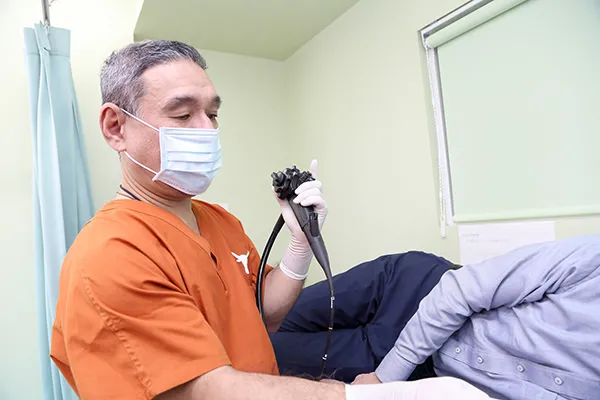
Every year, about 100,000 Japanese people are diagnosed with colon cancer and about 40,000 die of this disease.
In recent years, it has become the leading cause of death among women in particular (among men, it is the fourth after stomach cancer, lung cancer and liver cancer), and it is rising.
The only way to avoid dying of colon cancer is to discover it early.
Past research has revealed conditions that encourage colon cancer, and if these conditions apply to you, a regular colonoscopy helps with early discovery.
The following are these conditions.
Conditions that encourage colon cancer
- Sixty years of age or older
- A family history of colon cancer or polyps
- Enjoys eating meat with high animal fat content
- Consumes 2 or more alcohlic drinks a day
- Suffers from anal fistulae
- Men who do not drink milk
- Past history of ulcerative colitis
And even in cases where the above conditions do not exist, it is assumed that about 40% of people whose fecal occult blood test is positive will turn out to have polyps or colon cancer.
A research team formed by the Ministry of Health, Labour and Welfare has compared people who receive this examination and people who do not, showing that about half as many members of the former group are found to have advanced cancer as member of the latter group, and their death rate is 72% lower than that of the latter group.
The Minato shiba Clinic introduced colonoscopies in August 2015 and is working to discover colon cancer early.
We offer a painless method involving the injection of an anesthetic into the patient’s vein.
With this method, the patient is asleep when the procedure is completed, freeing the patient from stomach pain and embarrassment during the examination.
Preventable by eradicating Bacteroides fragilis
So, speaking from the perspective of preventive medicine, if we understand high risk conditions, there are probably methods of fighting its occurrence.
About 90% of intestinal resident bacteria of humans are Bacteroides fragilis.
It has been reported that injecting any of these bacteria that discharge toxins into mice, which are genetically susceptible to colon cancer, encourages the formation of tumors in their colons.
It has been reported that there are large quantities of Bacteroides fragilis that discharge toxins in the stomachs of colon cancer patients, and that eating animal fat aids the propagation of this kind of bacteria.
And it has also been reported that there are more of this kind of bacteria in Japanese people than in Europeans, and that about 60% of Japanese people have them.
Mutant mice which are genetically susceptible to colon cancer could be you to whom one of the above 7 conditions apply.
One way to reduce your susceptibility to cancer is assumed to be eradicating Bacteroides fragilis from your body.
This has still not achieved clear success among people, but in response to the findings of this research, the Minato shiba Clinic provides colon Bacteroides fragilis eradication therapy after discovering the bacteria in feces.
We recommend that after eradication, patients take a lactobacillus preparation in order to improve the balance of their enterobacteria.
Health examination
※ Fees are completely tax-excluded.
| New-hire health examination (health examination starting a new job), 8,300 yen (tax excl.) |
|
|---|---|
| Regular health examination: 4,300 yen |
|
Optional examinations
| Blood test: 3,000 yen |
|
|---|
Other optional examinations
| Gastrofiberscope examination (using a nasal tube camera) | 12,000 yen | |
|---|---|---|
| Colonoscopic examination | 20,000 yen | |
| Anesthesia during endoscopic examination (painless method) | 3,000 yen | |
| Helicobacter pylori examination (speedy) | 2,000 yen | |
| Urea breath test (UBT) | 5,300 yen | |
| Fecal occult blood test (2-day method) | 1,000 yen | |
| Abdominal ultrasonography | 5,000 yen | |
| Ultrasound echo of pharynx (thyroid gland, carotid artery) | 3,500 yen | |
| Tumor markers (stomach cancer, colon cancer, pancreatic cancer, liver cancer, lung cancer, prostate cancer, breast cancer, etc.) | From 2,000 yen | |
| Ultrasound echo of pharynx (thyroid gland, carotid artery) | Osteoporotic examination (bone marrow assay) | 1,000 yen |
| Osteoporotic examination (bone marrow assay) | 8,000 yen | |
| Hepatitis examination (type B, type C) | 3,000 yen | |
| HbA1c | 500 yen | |
| Lung function examination (lung age, etc.) | 3,300 yen | |
| ABC examination | 3,000 yen | |
| Electrocardiogram | 1,300 yen | |
About various of cancer examinations
Esophageal cancer examination
The endoscopic dyeing method does not overlook any lesions.
Smoking or drinking increase risk.
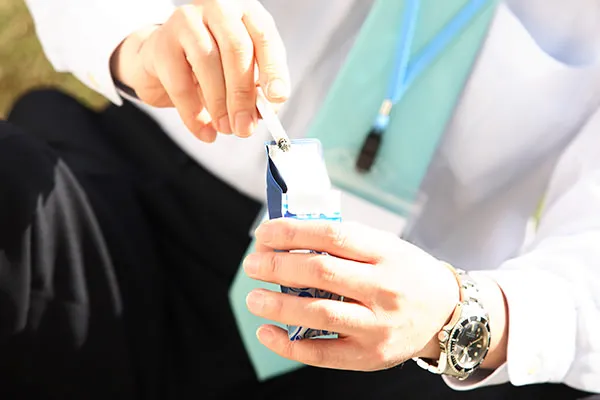
Esophageal cancer is increasing steadily, and it is said that in a few more years, 18,000 people will contract the disease annually.
The annual death rate rose to 10,000, and the prognosis for advanced cancer is still poor.
Did you know that people in high risk groups, which are those over 60, men, regular smokers or drinkers, people with symptoms of reflux esophagitis that are heartburn and belching, are likely to suffer from esophageal cancer?
Even missed by a barium X-ray
There are probably a lot of people who think that they had an abdominal examination that did not find any problem, so they are fine.
But it is not easy for a normal stomach cancer examination using barium to spot a slight change of the esophageal epithelium, which is an early indicator of esophageal cancer.
So our clinic has introduced the endoscopic dyeing method to perform detailed examinations for esophageal lesions which tend to be neglected by a stomach cancer examination.
This differs from normal endoscopy in that a coloring agent called Lugol's solution is spread on the esophageal epithelium to diagnose lesions by spotting differences in its stainability.
Lugol changes to a brown color on normal esophageal epithelium, but the color does not change on abnormal epithelium, so it can be distinguished visually with ease.
Later we do a biopsy of the abnormal epithelium tissue and examine it closely with a microscope.
If esophageal cancer is discovered early, endoscopic esophageal mucosal resection surgery is minimally invasive and can be counted on to ensure a good recovery rate (100% survival for 5 years).
We urge everyone in high risk group to have this examination.
Stomach cancer and helicobacter pylori
Double check for presence of Helicobacter pylori: antibody examination and endoscopy.
Every year, 110,000 Japanese people contract stomach cancer, and about 50,000 of them die.
The death rate is tending to fall, but Japan’s stomach cancer occurrence rate remains the world’s highest.
Cancer prevention effects of eradicating Helicobacter pylori
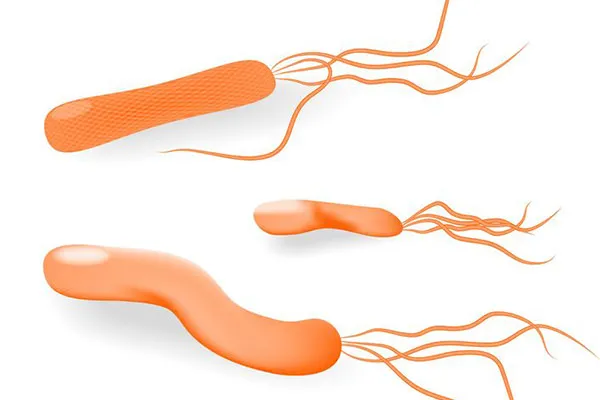
In recent years, Helicobacter pylori has been discovered in people’s stomachs, and it has been ascertained that it causes gastritis, gastric ulcers, and duodenal ulcers.
As a result of an epidemiological survey, in 1994, WHO (World Health Organization) designated Helicobacter pylori as a Group 1 carcinogen that causes stomach cancer.
Later, clinical research conducted in Japan showed that eradicating Helicobacter pylori prevents stomach cancer.
It is said that 60,000,000 Japanese people are infected with Helicobacter pylori.
Two percent of them, or about 1.04 million, suffer from gastric ulcers or duodenal ulcers, and 0.3%, or about 200,000 are struck by stomach cancer.
It is also reported that about 20,000 or about 10% of all stomach cancer patients are people with stomach cancer but without Helicobacter pylori.
Eradication cuts cancer cases by about 1/3
It has been reported that according to epidemiological research, people infected with Helicobacter pylori are 2.5 times as likely to contract stomach cancer than people without it.
It is said that between 60% and 70% of people over the age of 50 carry Helicobacter pylori, so it is probably correct to say that people over 50 who are infected with Helicobacter pylori are now in a group at high risk of stomach cancer.
This shows that the first step in avoiding stomach cancer is to learn if you are or are not a Helicobacter pylori carrier, and if you are, have it eradicated.
Recent research in Japan has shown that the stomach cancer occurrence rate among people who have had Helicobacter pylori eradicated is about 1/3 of those who have not had this done.
We believe that the younger a person is when it is eradicated, the greater its stomach cancer prevention effects.
There are various ways to diagnose people to find out whether or not they carry Helicobacter pylori, but our clinic uses two simple methods that reveal the result on-the-spot: a test to detect Helicobacter pylori in urine and the nasal tube gastrofiberscope examination.
We use both because only one examination could overlook a false negative (a negative result even though there are bacteria).
If the result of a urine test of a patient is positive, we investigate that patient for the presence of Helicobacter pylori by using an endoscope to detect and do a biopsy of lesions in the esophagus, stomach, and duodenum (sampling part of the gastric mucous membrane).
When we detect the presence of Helicobacter pylori, we start eradication therapy.
We decide to eradicate it by performing a urea breath test, so we do not do another endoscopic examination.
People with atrophy of the gastric mucous membrane or ulcers remain at risk of cancer, so we recommend that they regularly receive endoscopic examinations.
Generally, if a person is infected with Helicobacter pylori in childhood, without eradication therapy, the person remains infected.
It is thought that Helicobacter pylori does not infect adults, so there is no danger of reinfection after eradication.
A barium examination is highly likely to overlook a small lesion in the stomach, so it is correct to say that regardless of whether or not symptoms exist, it is important for people to aggressively arrange to receive Helicobacter pylori diagnosis and an endoscopic examination in order to protect themselves from stomach cancer.
The Minato shiba Clinic always performs examinations on every consultation day, so please do not hesitate to ask about it.
You have to make a reservation for an examination.
Diagnosis and eradication at the patient’s expense
And we diagnose Helicobacter pylori and perform eradication therapy at the patients’ expense.
If you do not wish an endoscopic examination, the diagnosis and therapy are both provided for a price of 20,000 yen (tax-excl.), so think about this approach.
For patients who find a barium examination of their stomach unbearable, the ABC blood test
Drinking barium to take a barium examination is distasteful, and patients are told that they must not burp during the examination. And if they do not take a purgative to remove the barium from their stomach, they will feel terrible, so we think that many people they will skip this exam if they can.
Some people have died following this examination.
But we can now ascertain whether or not a person has a diseased stomach by an ABC type blood test.
Some say that this method is an examination technique that will eventually replace barium examinations.
The ABC method can show the presence or absence of disease based on the numbers of Helicobacter pylori antibodies and pepsinogens.
An A judgment means normal, while a B or C judgment indicates the possibility of disease, so a gastrofiberscope examination must be done to thoroughly examine the stomach.
Patients pay a fee of 3,000 yen(tax-excl.) at their own expense for a diagnosis.
If you are worried about your stomach, do not hesitate to inquire about this procedure.
Endoscopy to detect Bacteroides fragilis and colon cancer
Early discovery sharply lowers the fatality rate.
Major cause of cancer among women
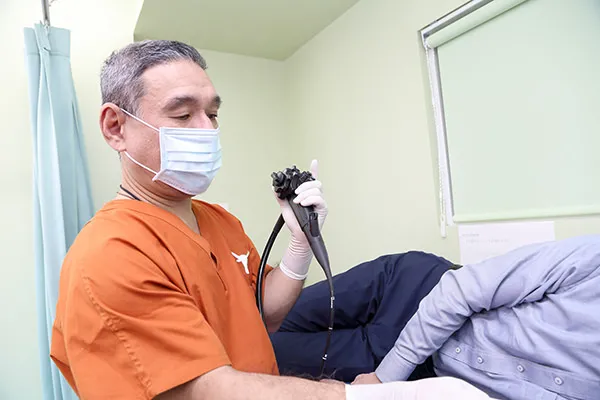
Every year, about 100,000 Japanese people are diagnosed with colon cancer and about 40,000 die of this disease.
In recent years, it has become the leading cause of death among women in particular (among men, it is the fourth after stomach cancer, lung cancer and liver cancer), and it is rising.
The only way to avoid dying of colon cancer is to discover it early.
Past research has revealed conditions that encourage colon cancer, and if these conditions apply to you, a regular colonoscopy helps with early discovery.
The following are these conditions.
Conditions that encourage colon cancer
- Sixty years of age or older
- A family history of colon cancer or polyps
- Enjoys eating meat with high animal fat content
- Consumes 2 or more alcohlic drinks a day
- Suffers from anal fistulae
- Men who do not drink milk
- Past history of ulcerative colitis
And even in cases where the above conditions do not exist, it is assumed that about 40% of people whose fecal occult blood test is positive will turn out to have polyps or colon cancer.
A research team formed by the Ministry of Health, Labour and Welfare has compared people who receive this examination and people who do not, showing that about half as many members of the former group are found to have advanced cancer as member of the latter group, and their death rate is 72% lower than that of the latter group.
The Minato shiba Clinic introduced colonoscopies in August 2015 and is working to discover colon cancer early.
We offer a painless method involving the injection of an anesthetic into the patient’s vein.
With this method, the patient is asleep when the procedure is completed, freeing the patient from stomach pain and embarrassment during the examination.
Preventable by eradicating Bacteroides fragilis
So, speaking from the perspective of preventive medicine, if we understand high risk conditions, there are probably methods of fighting its occurrence.
About 90% of intestinal resident bacteria of humans are Bacteroides fragilis.
It has been reported that injecting any of these bacteria that discharge toxins into mice, which are genetically susceptible to colon cancer, encourages the formation of tumors in their colons.
It has been reported that there are large quantities of Bacteroides fragilis that discharge toxins in the stomachs of colon cancer patients, and that eating animal fat aids the propagation of this kind of bacteria.
And it has also been reported that there are more of this kind of bacteria in Japanese people than in Europeans, and that about 60% of Japanese people have them.
Mutant mice which are genetically susceptible to colon cancer could be you to whom one of the above 7 conditions apply.
One way to reduce your susceptibility to cancer is assumed to be eradicating Bacteroides fragilis from your body.
This has still not achieved clear success among people, but in response to the findings of this research, the Minato shiba Clinic provides colon Bacteroides fragilis eradication therapy after discovering the bacteria in feces.
We recommend that after eradication, patients take a lactobacillus preparation in order to improve the balance of their enterobacteria.
Clinic Hours and Location
| Mon. | Tue. | Wed. | Thu. | Fri. | Sat. | Sun. / Nat'l Holidays | |
|---|---|---|---|---|---|---|---|
| 9:00 a.m. – 12:45 p.m. | ○ | ○ | × | ○ | ○ | ○ | × |
| 3:00 p.m. – 6:45 p.m. | ○ | ○ | × | ○ | ○ | × | × |
Kuwayama Bldg. 2nd floor, 2-12-1 Shiba, Minato-ku, Tokyo Googlemaps
4 min. on foot from Shibakoen Sta., 7 min. on foot from Mita Sta., 7 min. on foot from Daimon Sta. and 10 min. on foot from Hamamatsucho Sta.













